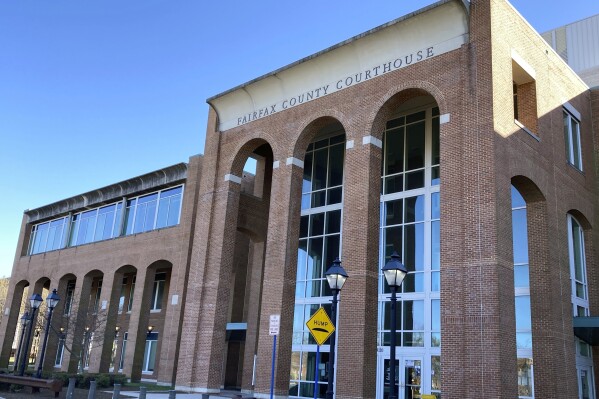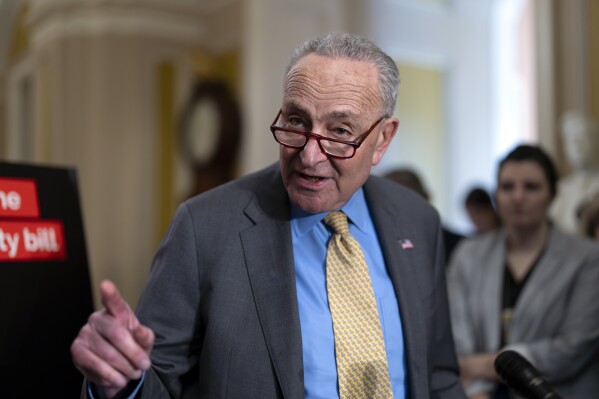Virginia General Assembly poised to vote on compromise budget deal reached with Youngkin
RICHMOND, Va. (AP) — Public schools would get more funding, teachers and other government workers would see a pay bump and Virginia’s tax policy would remain as is under a compromise budget Democratic lawmakers were expected to send Republican Gov. Glenn Youngkin on Monday.
Youngkin and General Assembly leaders negotiated an end last week to their long-running standoff over the state’s next two-year spending plan, agreeing to use higher-than-expected revenues to help fund key priorities without implementing a hotly debated new sales tax on digital goods like streaming services and computer software.
The plan was made public Saturday and was slated for a vote Monday in a special session set to begin at noon.
“I’m confident that we’ll get this budget done today,” House Speaker Don Scott said in a phone interview Monday morning.
Youngkin’s office has signaled his support for the deal. His press secretary, Christian Martinez, said in a statement last week that the governor “looks forward to finishing the work to deliver on our collective priorities for all Virginians.”
Documents prepared by the House and Senate money committees said the latest version of the budget for the 2024-2026 biennium retains virtually the same spending priorities as the version lawmakers adopted in March on the last day of their regular session, minus a few technical adjustments.



The plans includes what lawmakers have said is record funding for K-12 public schools and 3% raises in each year for teachers and state employees.
It was possible to maintain those and other allocations while ditching over $1 billion in expected revenue from the proposed new sales tax thanks in large part to the fact that revenue collections for fiscal year 2024 are running well ahead of forecast, a presentation from the House Appropriations Committee said.
Year-end revenue collections may eventually exceed what was forecast by more than $1.2 billion, and the budget lawmakers were set to consider Monday will be balanced if revenues increase by less than half that much — $525 million, according to the presentation.
Other technical changes helped close the gap, including updates to account for legislation Youngkin amended or vetoed, such as wiping out funding set aside for a now-nixed increase in the minimum wage.
“These changes represent an ‘easy take’ to allow the budget to be balanced with no tax policy adjustments,” the House presentation said.
The latest plan also calls for taking on debt instead of using $500 million in cash to finance capital outlay projects like construction or renovation initiatives.
Whether or not to include the new proposed tax on digital goods had been the biggest sticking point between lawmakers and the governor, who have spent months at odds over the budget.
Youngkin first proposed the idea in December, but he paired it with other tax policy changes Democrats stripped out during the legislative process, including an income tax cut, for an overall tax reduction.
The governor then launched a public tour criticizing the Democrats’ version of the spending plan as “backward” and said he wouldn’t sign legislation that increased taxes.
Democratic leaders launched a dueling tour of their own. The two sides finally agreed in April to lower the temperature and extend the timeline for talks rather than send Youngkin a budget he was likely to veto. Without an agreement by the start of the new fiscal year on July 1, they would have faced a government shutdown.
The House budget presentation suggested lawmakers may seek to revisit the issue of “tax system modernization” next year.
The latest version also lacks language forcing the state to rejoin a regional carbon cap-and-trade plan that Youngkin opposes and has taken Virginia out of in a move that’s being challenged in court. A coalition of environmental advocates criticized what they called “capitulation” by Assembly leaders to “reckless and bad public policy.”
The compromise deal also does not resolve one of this year’s most heavily lobbied issues — whether to legalize skill games, the slots-like betting machines that proliferated in businesses around the state before a ban took effect. Youngkin faces a Friday deadline to decide how to act on a bill green-lighting and taxing the machines after the General Assembly rejected many of his proposed changes to the measure in April.
Lawmakers were also expected to take up the so-called caboose budget on Monday, making small changes to the existing budget that runs through June.
Disclaimer: The copyright of this article belongs to the original author. Reposting this article is solely for the purpose of information dissemination and does not constitute any investment advice. If there is any infringement, please contact us immediately. We will make corrections or deletions as necessary. Thank you.



